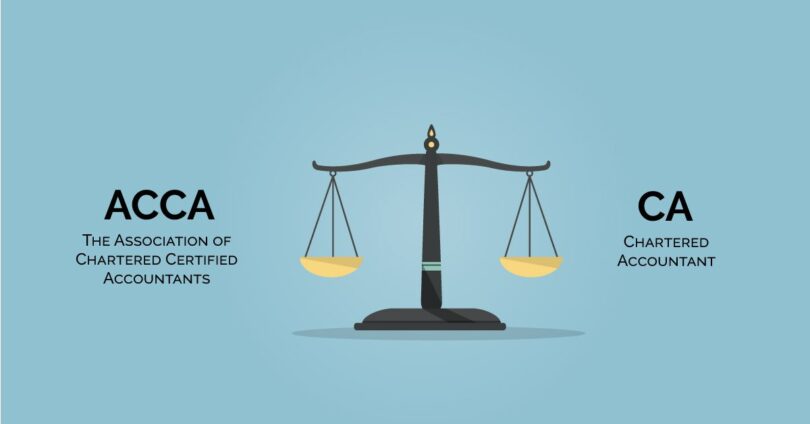When it comes to building a successful career in finance and accounting, selecting the right course is essential. The two most recognized qualifications include the Association of Chartered Certified Accountants or ACCA course and the Chartered Accountancy or CA. Each course provides several benefits, a wide career path, international recognition, which makes it vital to assess candidates to decide which aligns best with your career objectives.
While ACCA is globally recognized and opens career opportunities for professionals across worldwide.In contrast, the CA course is a highly valued qualification in India because it focuses on Indian accounting standards and taxation. Determining key differences in exam pattern, career scope, and other ACCA course details and CA course requirements can help you make informed decisions.
What is an ACCA Course?
The ACCA (Association of Chartered Certified Accountants) qualification is an internationally recognized program for aspiring financial and accounting professionals.It offers candidates an opportunity to gain knowledge and expertise in areas like auditing, taxation, financial reporting, and business strategy. The ACCA course details are specifically designed to provide students with technical capabilities as well as an awareness of ethics.
Pursuing ACCA course can open doors to international career opportunities, as it is recognized in over 180 countries. Moreover, ACCA membership improves professional credibility and further provides access to an international network of finance experts.
What is a CA Course?
CA (Chartered Accountancy) course is offered by Institute of Chartered Accountants of India (ICAI) for individuals seeking to become certified CA. This course equips candidates with in-depth knowledge of accounting, taxation, auditing, corporate laws, financial management and other sectors of finance and business operations in India.
Furthermore, the CA course has been divided into three main levels: CA Foundation, CA Intermediate, and CA Final.Along with passing these exams, students must complete mandatory practical training (articleship) under practicing CA.
What is the Difference Between CA and ACCA Course?
The decision between ACCA and CA courses is based on your career aspirations and preferred professional recognition. CA certification is well-suited for individuals seeking to build a career in India, with strong focus on Indian accounting and tax laws.
ACCA certification provides international recognition and wider understanding about International Accounting Standards. Knowing ACCA course details can assist you to decide if it aligns best with your ambition and goals.
| Factors | ACCA | CA |
| Qualification Body | Association of Chartered Certified Accountant (UK-Based) | National Bodies (Governed by ICAI in India and INCAEW in the United Kingdom) |
| Work Experience | 3 years of practical work experience and knowledge | Three years of intensive practical training under the supervision of a practicing CA |
| Course Structure | 13 papers (Knowledge, Skills and Strategic Professional Level) | Multiple stages (Foundation, Intermediate, and Final exams) including Ethics and Professional Skills module |
| Key Focus Area | International standards (Financial Management, Reporting, Accounting, and more) | National standards (corporate laws, auditing, taxation, and accounting) |
| Flexibility | It is considered as flexible with study pace and exam scheduling | It is structured with standard set exam schedule |
| Career Opportunities | International roles (Finance Analyst, Management Accountant, and more) | National role (Tax Consultant, Financial Auditor, Corporate Advisor, and more) |
| Course Duration | 3-4 years | 3-5 years |
Eligibility Requirements: CA and ACCA Course Details
A) ACCA Certification Eligibility
1. Educational Requirements:
- Minimum Education: Candidates must at least complete 10+2 (higher secondary education) for entry eligibility.
- Subject Requirement: Minimum of 65% in Mathematics or Accountants and English, and 50% in other subjects.
2. Graduation Degree (Any Stream)
Candidates who have completed bachelor’s degree (from any stream and recognized university) are eligible for pursuing ACCA qualification. However, having relevant degrees may provide your exemptions from a few ACCA papers.
3. Foundation in Accountancy (FIA) Route:
In case you don’t meet the 10+2 educational requirement, then consider pursuing a FIA course first, which will help understand key concepts and make you eligible for ACCA qualification.
B) CA Course Eligibility
To pursue CA in India, candidates must enroll in CA Foundation course after completing Class 12 board. However graduates or postgraduates in commerce with a minimum of 55% marks or non-commerce graduates with 60% can skip Foundation level and directly register for CA Intermediate level course.
After clearing Foundation and CA Intermediate, undergo articleship training for 3 years under practicing CA, and then clear CA Final exam. Throughout this journey, students need to also complete soft skills and IT training modules.
However, CA in the UK may have a different set of requirements. Candidates must have a university degree or relevant work experience. Unlike India’s stepwise exam process, UK CAs qualify via training contracts with approved employers with professional exams.
ACCA vs CA Course: Exam Structure
| Features | ACCA | CA |
| Exam Levels | Three (Knowledge, Skills and Professional Level) | Three (Foundation, Intermediate and CA Final) |
| Total Papers | 13 (A few exemptions are available) | 20 (4+8+8) |
| Exam Frequency | Quarterly (March, June, September, December) | Twice a year (May and November) |
| Passing Score | 50% in each paper | 40% in each paper and aggregate 50% |
Career Scope: ACCA and CA Qualification
| Factors | ACCA | CA |
| Job Opportunities | Global Companies, MNCs, Audit Firms, and Financial Institutions | Private and Government sectors, PSUs, and Indian Firms |
| Abroad Work | Easier to acquire due global recognition of ACCA | Requires additional qualification in most countries |
| Job Roles | Tax Advisor, Finance Analyst, Auditor, CFO, and Consultant | Finance Manager, Auditor, Tax Consultant and CFO |
| Practice Rights | Can practice in specific countries after meeting conditions | Can practice as CA in India after acquiring ICAI membership |
| Industry Demand | Highly valuable in Accounting and International Finance roles | High demand in Indian Taxation and Compliance roles |
Conclusion
Selecting CA and ACCA course depends on your long-term career goals, desired flexibility and location preference. If you want to be recognised globally and work in a variety of financial jobs, ACCA is the course for you. Whereas, if you are focused on building a career in India with expertise in audit and taxation, CA might be the right course for you. Get in touch with the Zell Education team to select the right finance course and build a successful career effectively!








